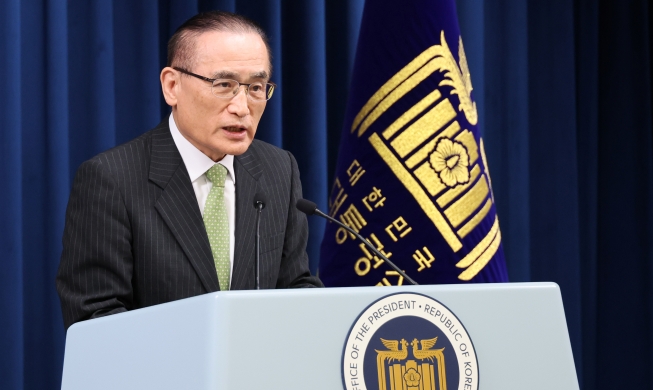Humans keep asking the same question, “Why?” every moment of their lives.
Whenever they face a misfortune or when a great piece of luck comes their way, this one question can lead to new, important directions in life.
If you're born fighting physical disabilities, if you have difficulty balancing when walking on your two legs, if you have trouble moving your hands, feet and mouth, and if you need someone’s help most of the time, such questions can lead your life toward a direction of skepticism and pessimism.
However, that didn't happen to Alexandre Jollien, a Swiss philosopher and author whose pen name is Hyecheon, meaning "a well of wisdom" (혜천, 慧泉). Born in Switzerland in 1975, he developed cerebral palsy after the umbilical cord coiled around his neck during birth. Struggling with the resultant physical difficulties, Jollien concentrated on researching and contemplating truth in the abstract, and on studying philosophy throughout his life.
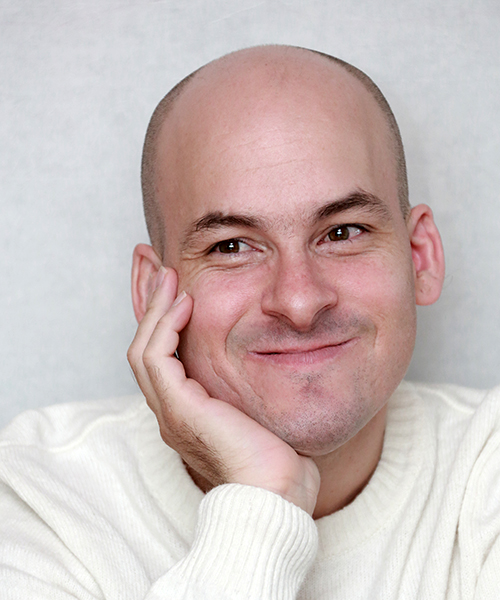
Published in 2015, “Vivre sans pourquoi,” or "Living Without Asking Why," is a book about the life Jollien wishes to pursue, but also about the ways in which he proposes to practice such life. He is a renowned philosopher and best-selling author in Europe. In 2013, he flew to Korea with his family, leaving all he had -- fame and a busy life there -- in order to practice truly letting go of everything in life. This book contains his thoughts and views about life during his time in Seoul.
“Living without questioning why” means living a life without considering what others say and to truly see oneself. It means being free from others’ points of view and from worries about the future. Such a life is not about resigning. It is, rather, about accepting one’s life in a positive manner, while spreading unconditional love toward others. Jollien said that “living without asking why” is not about abandoning all thoughts. He explains that, “It is, rather, focusing more on the present, not being obsessed by a future time.”
“Entering a life without questioning why means to look after our neighbors, be devoted to others, and strive to add more love and joy to the sea of pain in life.”
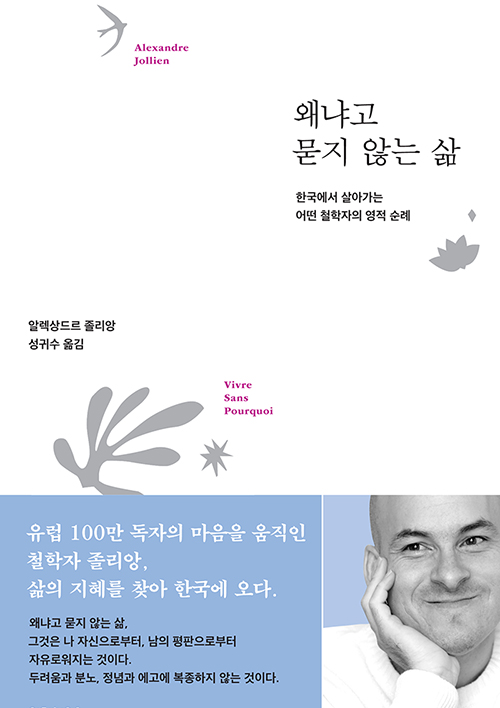
What he means by "the sea of pain" includes his endless struggle against physical disability. After settling in Seoul, Jollien said he has become much healthier than before. He said that the key to his better health is being free from thoughts that his hopes will be healed.
“I am a man with disabilities. This inevitable fact makes me feel unimaginably comfortable,” said Jollien, accepting his physical disabilities in an objective manner. “The one who heals me is not a doctor. One can win true health in the midst of the process of enduring all weaknesses, diseases, and all scars,” he said.
To accept a life in an active, positive manner, people should view their lives as they are. To do so, they need to reflect on their lives. For Jollien, Korea is a venue for such practice. Whether in the center of busy, downtown Seoul, in a dirty backstreet, or in a public bath, he puts into practice his forms of meditation and contemplation anywhere in Seoul, regardless of time or place. Jollien particularly adds more meaning to the public baths. He said, “Reflecting (관조, 觀照) is watching the world without myself. As people can see their naked body in the mirror in the public baths, we should be free from concerns about others’ eyes and greed, so that we can stand in front of god in the nude."
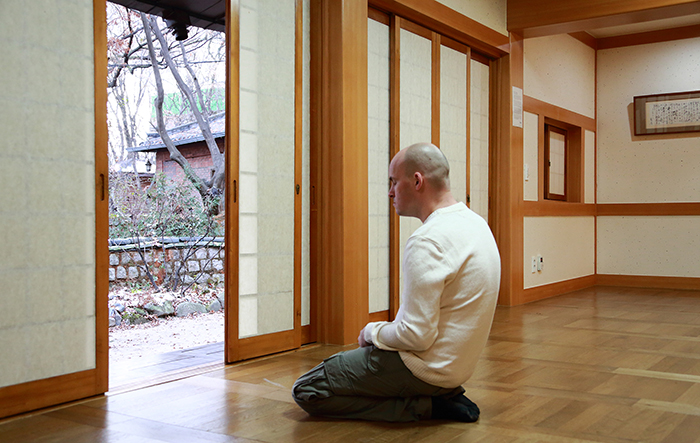
What he means by “practice” is self-discipline and the soul-searching journey undertaken by all truth-seekers. Jollien calls himself a Christian who practices Seon Buddhism, or Zen, while not defining himself specifically as someone who believes in all the tenets of either Christianity or Buddhism.
He said, “Those who follow Buddha and Christian believers can walk joyfully hand-in-hand together down the same path at any time. They can climb up to the same high peaks together.”
What he ultimately wants in life is happiness. Jollien said, “Happiness doesn't lie in the way we add something more to life. It's about cutting, lessening and simplifying the present condition. It's about taking out something that makes me feel uncomfortable, being naked and going upfront.”
Regarding his path toward life as part of the same, everyday, daily routine, he said, “Face hardships in a dignified manner; don't mess around with exhaustion. It doesn't lie in attempting something great. It rather lies in sticking to the same, continuous daily routine with passion, although it looks insignificant.”
[More about the author]
In his books, Jollien talks about living a life without being defeated by physical hardships. He wrote his first book, “Eloge de la faiblesse" (In Praise of Weakness) when he was 23-years-old in 1999. Since then, he has written several books that include “Le metier d'homme" (2001), “La construction de soi un usage de la philosophie” (2010) and “Petit traite de l’abandon: pensees pour accueillir la vie telle qu’elle se propose” (2011), which ranked at the top of the best sellers list at Amazon France for 32 weeks. Readers sympathized with his victories overcoming physical difficulties, and his sincere thoughts about life. He was considered a “happiness missionary” and actively presented his views on TV programs and lectures across Europe.
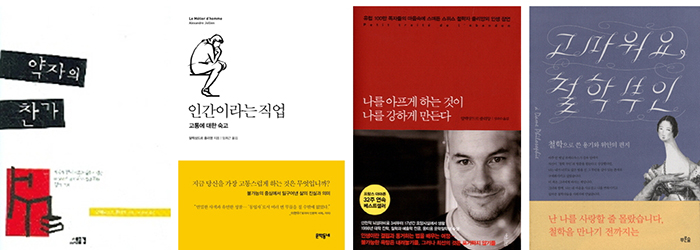
By Yoon Sojung
Photos: Interhouse
Korea.net Staff Writer
arete@korea.kr
Whenever they face a misfortune or when a great piece of luck comes their way, this one question can lead to new, important directions in life.
If you're born fighting physical disabilities, if you have difficulty balancing when walking on your two legs, if you have trouble moving your hands, feet and mouth, and if you need someone’s help most of the time, such questions can lead your life toward a direction of skepticism and pessimism.
However, that didn't happen to Alexandre Jollien, a Swiss philosopher and author whose pen name is Hyecheon, meaning "a well of wisdom" (혜천, 慧泉). Born in Switzerland in 1975, he developed cerebral palsy after the umbilical cord coiled around his neck during birth. Struggling with the resultant physical difficulties, Jollien concentrated on researching and contemplating truth in the abstract, and on studying philosophy throughout his life.

Alexandre Jollien is a Swiss philosopher and author.
Published in 2015, “Vivre sans pourquoi,” or "Living Without Asking Why," is a book about the life Jollien wishes to pursue, but also about the ways in which he proposes to practice such life. He is a renowned philosopher and best-selling author in Europe. In 2013, he flew to Korea with his family, leaving all he had -- fame and a busy life there -- in order to practice truly letting go of everything in life. This book contains his thoughts and views about life during his time in Seoul.
“Living without questioning why” means living a life without considering what others say and to truly see oneself. It means being free from others’ points of view and from worries about the future. Such a life is not about resigning. It is, rather, about accepting one’s life in a positive manner, while spreading unconditional love toward others. Jollien said that “living without asking why” is not about abandoning all thoughts. He explains that, “It is, rather, focusing more on the present, not being obsessed by a future time.”
“Entering a life without questioning why means to look after our neighbors, be devoted to others, and strive to add more love and joy to the sea of pain in life.”

Alexandre Jollien talks about his views on life in his book ‘Vivre sans pourquoi.’
What he means by "the sea of pain" includes his endless struggle against physical disability. After settling in Seoul, Jollien said he has become much healthier than before. He said that the key to his better health is being free from thoughts that his hopes will be healed.
“I am a man with disabilities. This inevitable fact makes me feel unimaginably comfortable,” said Jollien, accepting his physical disabilities in an objective manner. “The one who heals me is not a doctor. One can win true health in the midst of the process of enduring all weaknesses, diseases, and all scars,” he said.
To accept a life in an active, positive manner, people should view their lives as they are. To do so, they need to reflect on their lives. For Jollien, Korea is a venue for such practice. Whether in the center of busy, downtown Seoul, in a dirty backstreet, or in a public bath, he puts into practice his forms of meditation and contemplation anywhere in Seoul, regardless of time or place. Jollien particularly adds more meaning to the public baths. He said, “Reflecting (관조, 觀照) is watching the world without myself. As people can see their naked body in the mirror in the public baths, we should be free from concerns about others’ eyes and greed, so that we can stand in front of god in the nude."

Three years ago, he left his home, putting aside his fame and busy life in Europe, and headed to Korea. Since then, he has been practicing a life of contemplation and self-discipline during his time in Seoul.
What he means by “practice” is self-discipline and the soul-searching journey undertaken by all truth-seekers. Jollien calls himself a Christian who practices Seon Buddhism, or Zen, while not defining himself specifically as someone who believes in all the tenets of either Christianity or Buddhism.
He said, “Those who follow Buddha and Christian believers can walk joyfully hand-in-hand together down the same path at any time. They can climb up to the same high peaks together.”
What he ultimately wants in life is happiness. Jollien said, “Happiness doesn't lie in the way we add something more to life. It's about cutting, lessening and simplifying the present condition. It's about taking out something that makes me feel uncomfortable, being naked and going upfront.”
Regarding his path toward life as part of the same, everyday, daily routine, he said, “Face hardships in a dignified manner; don't mess around with exhaustion. It doesn't lie in attempting something great. It rather lies in sticking to the same, continuous daily routine with passion, although it looks insignificant.”
[More about the author]
In his books, Jollien talks about living a life without being defeated by physical hardships. He wrote his first book, “Eloge de la faiblesse" (In Praise of Weakness) when he was 23-years-old in 1999. Since then, he has written several books that include “Le metier d'homme" (2001), “La construction de soi un usage de la philosophie” (2010) and “Petit traite de l’abandon: pensees pour accueillir la vie telle qu’elle se propose” (2011), which ranked at the top of the best sellers list at Amazon France for 32 weeks. Readers sympathized with his victories overcoming physical difficulties, and his sincere thoughts about life. He was considered a “happiness missionary” and actively presented his views on TV programs and lectures across Europe.

In his books, Jollien talks about ways to live a life by accepting it as it is in an active manner. His books include 'Eloge de la faiblesse' (1999) (In Praise of Weakness), 'Le metier d'homme' (2001), 'La construction de soi un usage de la philosophie' (2010) and 'Petit traite de l’abandon: pensees pour accueillir la vie telle qu’elle se propose' (2011).
By Yoon Sojung
Photos: Interhouse
Korea.net Staff Writer
arete@korea.kr
